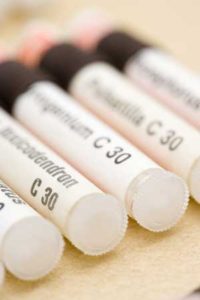History of Homeopathy
Homeopathy has been around for more than 200 years and is practiced in nearly every country worldwide to this day. Samuel Hahnemann, studied Ancient Greek medicinal practitioners and used these findings to develop his practice of homeopathy in 1796.
The idea of homeopathy is that the body has the ability to heal itself naturally. Symptoms are the body’s way of showing what is happening internally and letting us know what needs to be corrected. Homeopathy, unlike conventional medicine views symptoms as normal body function and a natural process to help the body restore a healthy balance.
Like Cures Like
 Homeopathy is “the treatment of disease by administering minute doses of natural substances that in a healthy person would produce symptoms of disease.”
Homeopathy is “the treatment of disease by administering minute doses of natural substances that in a healthy person would produce symptoms of disease.”
The smallest possible amount of an active ingredient is used in Homeopathic remedies in order to help treat or cure a disease. Sometimes this same ingredient can be the contritubing factor to an illness in the first place. Another way to put this concept: “like cures like”!
“that which a substance is capable of causing, it is also capable of curing.”
Individualized Plan of Care
One of the foundations of Homeopathic medicine is that the treatments are individualized to each person’s specific symptoms, history, body, and emotional state.
 Unlike traditional medicine where one prescription medicine fits all, Homeopathic treatment is unique for each person. Two people facing the same illness can receive completely different treatment plans based on their overall homeopathy assessment.
Unlike traditional medicine where one prescription medicine fits all, Homeopathic treatment is unique for each person. Two people facing the same illness can receive completely different treatment plans based on their overall homeopathy assessment.
In additional to physical body symptoms the emotional state of a patient and personality are very highly regarded in Homeopathy. A Homeopathic doctor will often talk in depth with a patient and get to know and understand their individual stress levels, relationships, family, and behaviors. The homeopathic doctor will then be able to assess the body as a whole internally as well as external factors to create an individualized plan of care for you.

